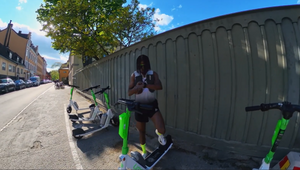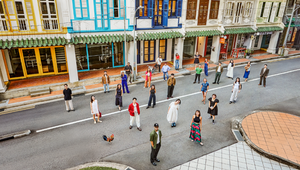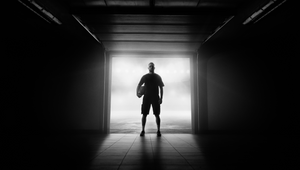
5 Minutes with… Sophia Lindholm

Swedish-born creative agency Forsman & Bodenfors doesn’t have any creative directors, so it tends not to produce the sort of creative stars that our 5 Minutes with… channel lets you spend some time with. In true Scandinavian style, it’s not about egos there - the collective means more. Sophia Lindholm’s job title is ‘only’ art director, but if you look at the campaigns she’s helped formulate it’s clear she brings something special to her clients’ briefs.
Sophia is one of the creatives behind the ‘Epic Split’ and Volvo Trucks’ ‘Live Test Series’ - some of the most memorable advertising moments of the last decade - as well as the ‘Leftover Women’ campaign for Japanese cosmetics brand SK-II that deservedly picked up a Glass Lion at Cannes Lions a couple of years back.
Curious about her life as part of one of the most horizontally-structured agencies in the world (even though it recently ballooned to 700 employees in a global merger with KBS), LBB’s Alex Reeves caught up with her for a chat.
LBB> Where did you grow up and what kind of kid were you? Was your inner art director obvious to people around you?
Sophia> I grew up outside of Gothenburg on the Swedish west coast. I don’t think it was obvious that I would turn into an art director but I was a pretty creative kid, always on a mission to do something. Good and bad.
LBB> When did you first consider going into advertising as a career?
Sophia> It took me quite some time to understand that advertising could be something for me. I didn’t know much about advertising growing up but I always knew I wanted to work with something in the creative field.
To be honest the biggest reason why I started ad school was probably that the school gave us brand new iBooks, the first to arrive in Sweden. This was back in ‘99 so it was pretty great.
LBB> You’ve been working on the Volvo account for a good few years now, but I have to ask you about Epic Split. That was a special moment in advertising. How did it feel at the time you were working on it?
Sophia> At that moment we had worked with the concept Live Test Series, including the Ballerina Stunt, for a couple of years and we were constantly coming up with new ideas for more live tests.
Our initial thought behind the Epic Split was to shoot it in one take but after having made several live tests following the same execution style it wasn’t an easy decision to take.
In fact, a lot of people at the agency told us to stick to what we knew was a success recipe.
But when the director, Andreas Nilsson, showed us the first animatic of the film we felt we had made the right decision. The moment I realised it was going to turn into something very special was when he played it together with his first music suggestion, Enya ‘Only Time’.
LBB> More generally, what is working on Volvo like? How does it feel different to other brands and what are your biggest considerations?
Sophia> I dreaded working on Volvo Trucks. It was a business to business account and all I could think about was motor shows and electric guitars. And to be honest I wasn’t even interested in cars. Or trucks.
But on the other hand, I never had a dream of working on a specific brand. I’ve always felt that the only thing that really matters is the humans behind the brand. That the clients you are working with know what they want, even if they might not know the exact way of getting there. Smart and brave people who are willing to do something new and unexpected. And I’m lucky enough to get to work with people like that, both on Volvo Trucks and Volvo Cars.
LBB> You’ve been at Forsman & Bodenfors for 12 years now. I hear it’s pretty common at your agency to stay a long time though. What is it about the agency that’s kept you (and so many others) so loyal?
Sophia> First of all, it’s the people I get to work with. So many talented and fun people that I get to call my colleagues.
Then I think it’s all about how we work. The fact that the client teams are fully responsible for what they do and that we don’t have any creative directors or other hierarchies.
I love the fact that the only boss is the task itself. Which means that the work we do is the only thing that really matters. The team is responsible and the only one we present for is the client.
LBB> F&B went through a massive change in the past year with the KBS merger. How have you found the process of adapting to being a much bigger agency in such a short space of time?
Sophia> Considering the changes and the challenges all mergers come with, I think it’s going pretty well. Most days it's business as usual and I almost forget that we are a part of something much bigger now.
I think in the same way our client teams are to work as small enterprises, so should our different offices. We need to keep the focus on our local clients and our everyday work but when we need and want - it’s fantastic to have access to a global team of creatives, strategists and technologists.
LBB> The F&B agency culture is pretty unique! What have you learnt about agency culture since the merger?
Sophia> That culture is culture and that you have to live it to understand it. You can try to write it down and to talk about it for hours but it’s not until we actually mix teams and work together that we truly understand and can embrace it.
LBB> Let’s talk about the Volvo Equal Vehicles for All initiative. Where did that idea begin for you?
Sophia> A while back I read that women were not as safe as men when driving or riding in cars. So when Volvo briefed us about their upcoming safety campaign, I asked the question that would lead to us eventually coming up with The E.V.A. Initiative. To put it short, that became the starting point for our whole campaign.
Initially, the brief was about celebrating the three-point safety belt that Volvo invented 60 years ago. But when we realised that Volvo was at the forefront of equal crash tests, we saw an opportunity we didn’t want to miss. And when we learned that Volvo has gathered data since the 1970s to make their cars equally safe for everyone, it became even clearer to us.
So instead of creating a campaign that simply celebrated the safety belt, we thought: what if we could get Volvo to share their data to make all cars safer for women? And that’s how The E.V.A. Initiative was born. So we collected all of Volvo’s safety research and made it available to the entire car industry. But to make the data more human, we gave the numbers a face and showed how it affects women in a personal and direct way. I think the human part of the campaign was crucial in getting people to care about an issue that might seem hard to grasp at first.
LBB> Have you read Invisible Women by Caroline Criado Perez? The world being designed for men seems to be a big talking point at the moment. Did that play into the idea?
Sophia> I haven’t read it but I’ve read about it, if that makes sense. When we were working on the campaign, we heard that it was coming out and some of the facts in the book would also inspire our work. Adding on to that, it always helps when you’re tapping into some sort of cultural movement. Even though data can be depressing in itself, it’s important to highlight the numbers and show the world why it matters. Of course, it also felt good to not just talk about it, but actually do something about it.
LBB> How are Volvo changing their cars to be better designed for women, based on this research?
Sophia> Volvo has gathered real-world data since the 1970s. This means that every time a serious accident happens, they perform detailed studies at the scene of the accident. By collecting this data for a long time, it has been possible to identify what injuries arise in different accidents for men, women, and children.
The best examples of how they have implemented this data in their cars are SIPS (Side Impact Protection System), WHIPS (Whiplash Protection System), and with numerous child safety products.
They have also tested with a female crash test dummy since 1995. And that’s how Volvo design their cars to be safer for all people — regardless of size and gender. As a result, it has led to many of the safety systems they have in their cars today.
LBB> What other work have you been especially proud of recently?
Sophia> A campaign that I’m really proud of is our Chinese campaign The Marriage Market for beauty brand SK-II. Even though we launched it in 2016 we hear it is still inspiring women to talk about the term ‘Leftover Women’ and the marriage pressure they feel from their parents.
LBB> Which aspects of the creative process are most enjoyable for you?
Sophia> When we are at our best we dig deep and come up with ideas that solve our clients’ real problems. And I love the fact that that can be anything from making people laugh, to sparking a conversation about something or to actually make this world a little bit safer for women.
LBB> What do you like to do in your spare time? Any current obsessions?
Sophia> Tomatoes. It’s definitely an obsession and I desperately need to plant my seeds now.















